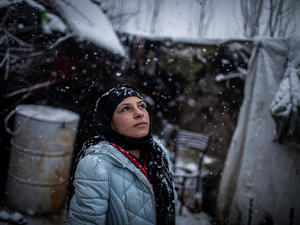UNHCR concerned as recent waves of sectarian violence threatens new internal displacement of Iraqis
UNHCR concerned as recent waves of sectarian violence threatens new internal displacement of Iraqis
In Iraq, UNHCR is concerned as recent waves of sectarian violence threatens to spark a new internal displacement of Iraqis fleeing the recent horrific bombings and other attacks.
Since the beginning of the year, bombings and rising sectarian tensions have displaced some 5,000 Iraqis, with people mostly fleeing from Baghdad into Anbar and Salah Al Din governorates, as well as causing displacement within Diyala and Ninewa governorates.
Reports from the last two weeks suggest that up to 160 families from Basra and Thi Qar were displaced into Salah al Din and Anbar and 57 families from Baghdad arrived in Babylon. A smaller number of families have also fled from various governorates into Kerbala, Najaf and Wassit. Those displaced so far include Sunni Arabs, Kurds, Shia Shabak, Turkmen as well as Shia Arabs who are in minority situation.
UNHCR and its partners have conducted needs assessments of the newly displaced people and is advocating with the government of Iraq for their registration. In coordination with the government, UNHCR and our partners ensure that food, core relief items, education and adequate accommodation are provided and that relevant identity and residency cards are also supplied.
This recent displacement adds to the over 1.13 million internally displaced people inside Iraq that fled their homes amidst the 2006-2008 sectarian violence mostly residing in Baghdad, Diyala and Ninewa governorates.
Some 467,000 internally displaced people, returnees and squatters remain in more than 382 settlements on public land or in public buildings, enduring harsh living conditions and with limited access to electricity, adequate sanitation, schooling or sufficient job opportunities despite efforts from the governorates and others. Many may be at risk of eviction. UNHCR with the IDP working group has been working with the government, particularly with the Ministry of Displacement and Migration, on a comprehensive plan to end displacement. This incorporates the development of policies on integration as well as livelihood, employment opportunities and shelter programmes.
Meanwhile, following the attack on Camp New Iraq on 1 September in which more than 50 residents died UNHCR remains gravely concerned for the safety of seven former residents of the site who remain unaccounted for. According to reports reaching UNHCR, the missing persons are reportedly being held somewhere in Iraq and may be at risk of being returned involuntarily to Iran, which would be a serious breach of international law. These seven are all known by UNHCR to be asylum-seekers, and UNHCR wants to have the opportunity to interview them.
In light of the numerous and persistent reports over the past week that these individuals may be at risk of forced return to Iran, UNHCR calls upon the Government of Iraq to locate them, to ensure their physical security and to safeguard them against return to Iran against their will. UNHCR furthermore urges the government to ensure the protection of the residents of Hurriya temporary transit location and calls on the international community to find solutions outside Iraq as a matter of urgency.
For more information on this topic, please contact:
- In Amman, Peter Kessler at +962 79 631 79 01 or [email protected]
- Jessica Hyba at +962 79 777 87 97 or [email protected]
- In Geneva, Melissa Fleming at +41 79 557 9122 or [email protected]
- Dan McNorton at +41 79 217 30 11 or [email protected]






